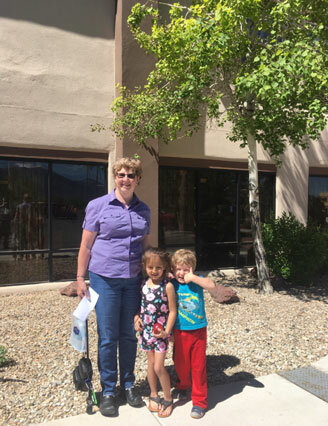
Susan Nossaman with grandkids.
By Rose Chavez | Food System/Food Equity Coalition
The Archuleta County Nutrition Security and Health Equity Assessment, which kicked off in December 2021, is continuing its ongoing work to engage the community through a Community Learning and Leadership Circle (CLLC) that meets on a weekly basis.
The CLLC is made up of a group of diverse Archuleta County community members who are committed to contributing to the design of the assessment during this first phase of the project, which will conclude at the end of June. CLLC members engage in learning through module presentations facilitated by Healthy Archuleta and partner organizations about the concepts of nutrition security and health equity.
On a weekly basis, the CLLC members helped inform the assessment as it relates to 1) primary/preventive health care access and utilization (coverage, timeliness, workforce and services) and 2) bolstering our community-based food system (food production, food transformation, marketing and distribution, getting and preparing food, eating nutritious foods, food safety, food waste prevention and resource recovery).
A community-based participatory approach is used to capture people’s voices and lived experiences related to access to food and primary/preventive health care in Archuleta County. Additionally, both food and health care organizations will have the opportunity to share information as it relates to primary/preventative health care and food efforts.
Healthy Archuleta is sharing individual profiles of CLLC community members who are serving their community in this capacity. This week, we are featuring CLLC member Susan Nossaman:
1. Health is the new wealth. What does that mean for you and your family’s health in Archuleta County? “To me, health means doing what is possible to prevent chronic disease. I know diabetes runs in my family so I try to eat a balanced diet and exercise. It’s easy and tempting to eat a lot of fast food because it’s cheap and convenient, but I try to avoid it as much as possible.”
2. What are your ties to Archuleta County? “My ties to Archuleta County go way back. On my dad’s side of the family, his great-uncle was one of the first white people to come here and settle. On my mom’s side, her grandparents came through Pagosa on their way to Animas City. My great grandfather, a Civil War vet, took advantage of soaking in the spring water to help ease the pain of his war wounds. Their daughter, my grandma, came to Pagosa as a teacher for the Bayles school and married my grandfather who came to Pagosa to homestead. My mom was one of their four daughters. My dad grew up in Arboles which was about as far west in Archuleta county as you could go. That place is under Navajo Lake now.”
3. What do you see as your role on the CLLC for the Nutrition Security and Health Equity Assessment? “As a member of the CLLC I would like to see our county become more self-sufficient in producing our own food. Years ago, my grandparents always raised large gardens and preserved the vegetables to last through the winter months as much as possible because they weren’t able to run into town whenever they needed something. It’s nice to have the huge variety of food found in a grocery store, but there are basic things that grow here that can be extra healthy and good, too. I also believe the effort the CLLC is putting into finding more about health equity is really important for the county. Our research into the system and how we might change some things so that everyone can access basic healthcare is extremely important.”
4. What is your vision for a healthy Archuleta? “My vision for a Healthy Archuleta is one where people do not have to worry about food insecurity or getting basic health care.”
5. What do you think is critical about the dynamics of learning and leading on the CLLC for this assessment? “I think the critical part of our assessment will be to really reach out to as many people in the community as possible of as many different demographics as possible. The CLLC can’t afford to do a superficial assessment if it expects to make a meaningful impact in regards to nutrition security and health equity.”
For more information, please contact us at fsfearchuleta@gmail.org or (401) 371-3227. To donate to support the work of Healthy Archuleta, doing business as the FSFE — Food Coalition, please visit: https://www.foodcoalition4archuleta.org/donate.html.